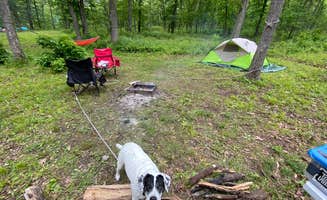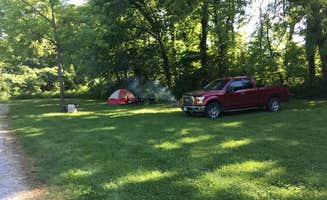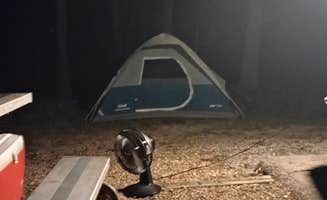Primitive campsites near Tuscumbia, Missouri cluster around conservation areas and river access points within a 30-mile radius. Most locations operate year-round but become challenging to access after heavy rainfall when gravel roads deteriorate. The terrain ranges from flat riverbank campsites to slightly elevated areas under oak and hickory trees, offering natural windbreaks during spring and fall when temperature fluctuations can exceed 30 degrees within 24 hours.
What to do
Fishing access points: Paydown Access provides direct river entry for anglers targeting smallmouth bass and catfish. "Beautiful, very secluded, and we were the only ones there. The police drove by around 11 pm which had us wondering if some people hang out and party there on occasion," notes a Paydown Access visitor.
Wildlife observation: Conservation areas support diverse species viewable from established camping areas. At Fiery Fork Conservation Area, one camper reported: "We were able to see some wildlife while staying there as well. Armadillos, deer, and a few different bird types could be found easily."
Water recreation: Multiple access points allow for swimming and paddling. "It's a great place to launch a boat from or just to wade in a bit and fish. Fly fishing can be done easily from the bank or just by wading in a bit," explains an experienced Fiery Fork visitor.
What campers like
Budget-friendly options: Most conservation areas offer free camping with basic amenities. A camper at Fiery Fork described it as "a nice place if your on a budget and just need a get away."
Spacious campsites: Many locations provide adequate separation between sites. At Scrivner Road Conservation Area, a reviewer noted: "This Missouri Conservation area is a Swiss Army knife of rugged of the path camping. Rivers, Lakes, Gun range, Horses and hiking can all be enjoyed here."
Multi-activity options: Several areas combine camping with recreational shooting, horseback riding, and water access. "Far from any city noise or roadway, there's two camp areas with many sites that are mowed/maintained with fire pits (and some concrete tables)," reports a Fiery Fork visitor.
What you should know
Road conditions: Gravel access roads present challenges for low-clearance vehicles. A Fiery Fork visitor warned: "I recommend smaller RVs due to the 2 miles of gravel and high water areas you go through to get there."
Trash management: Most areas lack trash collection. "The area was covered in trash. Bring extra trash bags!" notes one Pikes Camp visitor, while another camper mentioned: "There is no dumpster so be prepared to take your trash with you."
Mobile connectivity: Cell service varies dramatically between locations. "We have AT&T for our cell service and there was absolutely NO service there which was good to get away, but bad in an emergency," reported a Fiery Fork visitor.
Tips for camping with families
River safety: Water levels fluctuate seasonally, affecting campsite access and safety. "If the waters too high, there's a bridge into the site that could be flooded so watch the weather," warns a camper at Fiery Fork.
Insect preparation: Tick activity increases significantly during summer months. A visitor noted: "Ticks galore! Also be prepared to have no cell signal...had to drive a couple of miles for a signal."
Recreational options: Several areas feature natural play spaces for children. A DnD Campground Lakeside visitor mentioned: "We decided it would be a nice place to bring our kids since there is quite a bit of 'beach' at the river access for them to play and see nature."
Tips from RVers
Site accessibility: Many conservation areas have limited turnaround space for larger vehicles. "Great little river access. Has a shaded grassy area for camping. No power vault toilets," reports a visitor to Pikes Camp.
Seasonal considerations: Spring access becomes problematic during wet periods. "Stayed at the first set of camping spots which were about 5/6. Fire rings and tables provided. Also a vault toilet was available," notes a Fiery Fork reviewer who visited during optimal conditions.
Overnight security: Remote areas receive periodic law enforcement patrols. "We were the only ones camping out which was nice. The latrine had plenty of toilet paper which was nice as well," reports a conservation area camper describing weekend conditions.




